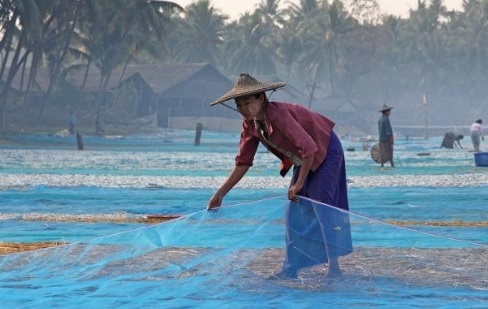Resilience to climate change in Asia-Pacific depends on gender equality, says UNEP

The United Nations Environment Programme have highlighted that for the Asia-Pacific region to develop a long term and sustainable resilience to the effects of climate change, they must address two key factors: human vulnerability and gender inequality.
Around the world women are effected more significantly and frequently by climate change than men. The latest UN figures reveal that 80% of people displaced by climate change are women.
The typical role of women as primary caregivers and providers of food and fuel make them far more vulnerable to the effects of flooding and drought.
In the Asia-Pacific region, women and girls make up 80% of those living on less than $2 dollars a day, making them some of the most vulnerable members of the population.
A large number of women in the Asia-Pacific region earn their livelihoods in sectors that are particularly threatened by climate change, for example: fishing and agriculture.
In addition, women face barriers to accessing natural resources, finance, energy, technology, healthcare, education and property.
UNEP reports that in order to solve the problem of climate change impacting women and disadvantaged groups most significantly they need to be included in the decisions and actions relating to climate change adaption and resilience.
The Government of Sweden has joint forces with UNEP and UN Women to ensure the protection of human rights and promotion of gender equality in Asia-Pacific’s efforts to reduce disaster and adapt to climate change.
The announcement on International Women’s Day follows Sweden's increased support of the Joint Programme on Accelerating Progress towards the Economic Empowerment of Rural Women (JP RWEE) earlier in the week.
Anne-Charlotte Malm, Head of Regional Development Cooperation at the Embassy of Sweden, Bangkok commented:
“Cooperation is crucial to addressing the challenges the Asia-Pacific region faces today and this innovative collaboration between two UN organizations with different thematic mandates is a good step in that direction”
“The project fits well with Sweden’s priorities in Asia and the Pacific: to contribute to sustainable development by working regionally, through mutual interaction between human rights, democracy, gender equality, environment and climate change. In this way, we are convinced that this partnership will strengthen resilience in the region”
The project between UNEP, UN Women and the Government of Sweden will allow women to be included in the disaster reduction actions and provide them with the tools to become renewable energy entrepreneurs.
By providing women with the tools to become renewable energy entrepreneurs they can benefit their wider communities, as access to clean energy has a multiplier effect that improves livelihoods, health, education and safety.
Ms. Miwa Kato, Regional Director for UN Women in Asia and the Pacific added:
“UN Women is excited that through this project we are addressing crucial issues of gender equality and human rights in the context of resilience to climate change and disaster. In five years’ time, UN Women, together with its partners, hopes to see women and disadvantaged groups not only more resilient but also empowered to take decisions and lead actions on climate change and disasters”
Dechen Tsering, Regional Director for UN Environment in Asia-Pacific also noted the importance of the partnership:
“UN Environment welcomes this unique partnership with UN Women, which will support women and marginalized groups to participate in climate change action and provide them with the means to access renewable energy, which can transform lives”
Join us at the 4th Annual Aid & Development Asia Summit on 20-21 June 2018 in Bangkok Thailand to discuss the priorities for disaster prevention in Asia.
If you’d like to stay informed on the latest updates in aid and development, please sign up for the AIDF newsletter.
Image credit: Jean-Marie Hullot, UNEP













